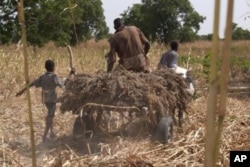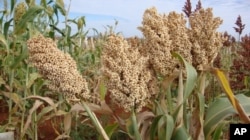Fifty-five-year old Ahmed Abubakar Maidu, is one of the farmers who has been linked to a produce market by ICRISAT and its partners, the Lake Chad Research Institute in Maiduguri and the Green Sahel and Rural Development Initiative in Jagawa state.
Maidu lives in Gagagrawa local government area of Jigawa State in northern Nigeria. He grows a number of different food crops on his farm, but in the past he could hardly meet his family’s needs for food and cash.
All this changed for Maidu when ICRISAT introduced him to new growing methods and improved seed varieties for the crops he grows.
"Now, due to the introduction of new farming technology, I double what I use to get," he explained. "For example, this year I planted one and half acres only, but I have 30 bags of pearl millet, 15 bags of sesame and three bags of cowpea."
He said the harvested crops are split; some are used for home consumption and the rest are sold to earn cash for the family. The seeds are kept for the next farming season.
Maidu said after many years of poor harvest and sales, ICRISAT and its partners have introduced him to new markets for his produce.
"These marketers invited us," he said, "and told us they have got a good market where they are going to lead us to sell our farm produce."
Today, he earns about 500,000 naira, or $3,100 per year, which is much higher than in past years.
He now sells his farm produce at Maigatari and Babura markets on the border of Niger, and to the agro-food processing campany in Kano, Dala Foods, Limited.
Bashir Alhaji Baba is market specialist at Lake Chad Research Institute, Maiduguri, funded by the Nigerian government, a partner in the ICRISAT project.
He said improved sales of Maidu's crops are part of an effort to help poor millet and pearl sorghum farmers.
"We actually organize the farmers and the markets themselves," he explained, "so that they will be buying from the farmers at lucrative prices…so that both the farmers and the marketers will benefit."
He said to increase yield and income, farmers are introduced to new varieties of pearl surghum and millet.
Dr. Hakeem Ajeigbe is ICRISAT country representative and system agronomist working with the project.
He said farmers are taught to use a technique called microdosing, or applying small amounts of fertilizer with the seed at planting time. Ajeigbe said the method has been used in neighboring countries.
"Taking the [technique] of microdosing for surghum and millet…was developed elsewhere in [Niger] and other West Africa countries, but we have adopted it," he said.
Ajeigbe said farmers are also trained in improved management options and are linked to seed companies.
George Okwach is project manager specializing in sorghum and millet.
He said the primary objective of the project is to improve yields for household consumption of up 40%.
That’s good news to households in northern Nigeria, where millet is used for making a thick dough called“fura” and as an additive to fresh cow milk for the popular drink “fura da nunnu.” It is also used for making millet juice, or “kunnun zaki” and for preparing a custard-like food called “kwoko.”
Okwach said increased grain production should also give farmers more money to support their families.
"Food security," he said, "is a very elusive concept in much of dry land tropics, Africa included. There are crop failures nearly every year and so farmers hardly have enough food to sustain them from one year to another."
The effort in northern Nigeria is part of an ICRISAT project called HOPE, or Harnessing Opportunities for Productivity Enhancement of Sorghum and Millets in Sub-Saharan Africa and South Asia. The four-year project, which is funded by Bill & Melinda Gates Foundation, is providing support to 110,000 households in 10 countries of sub-Saharan Africa.
ICRISAT is a non-profit organization devoted to science-based agricultural development. It’s one of 15 research institutes in the Consultative Group on International Agricultural Research, a network of centers funded by United Nations.






